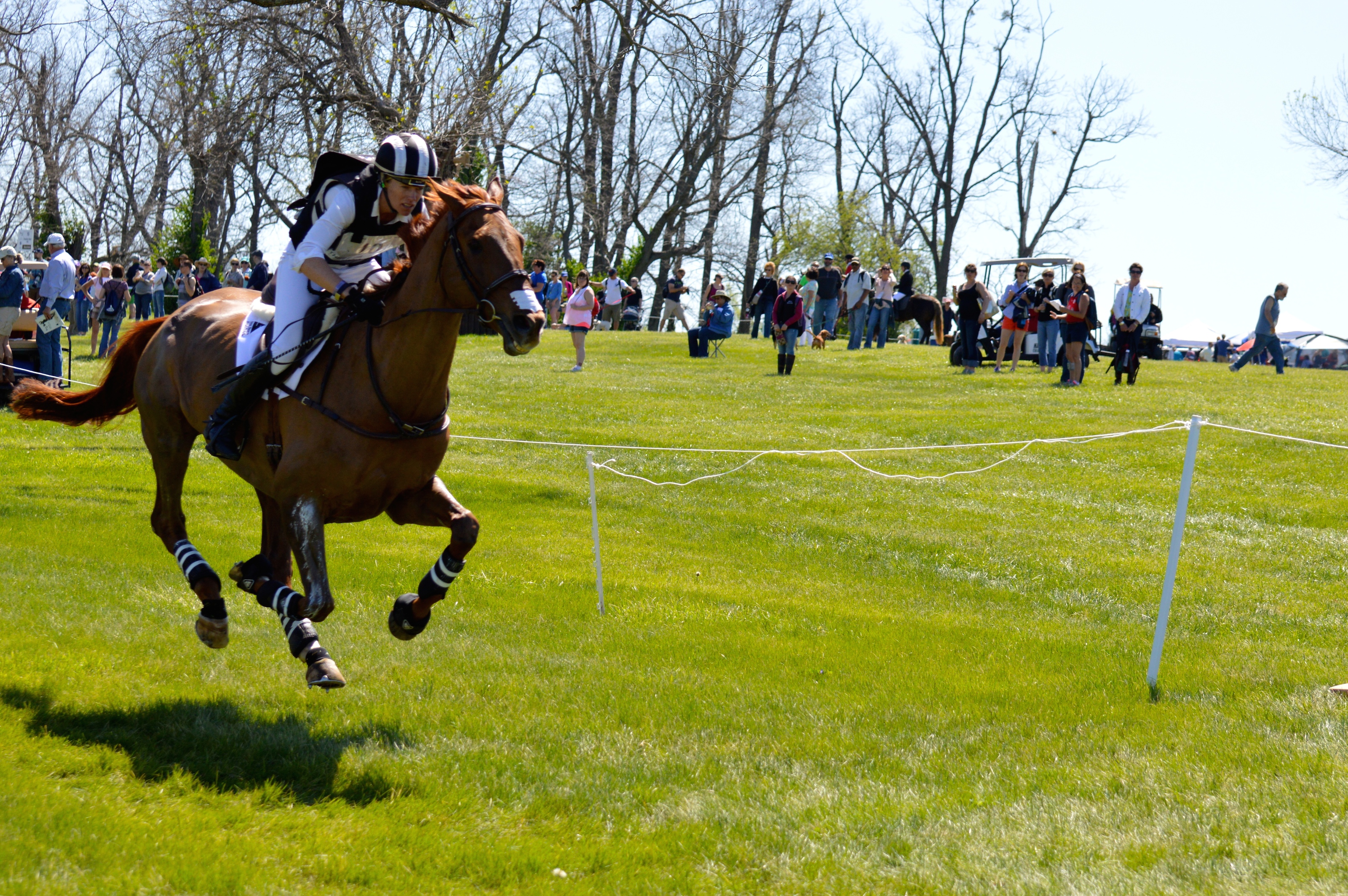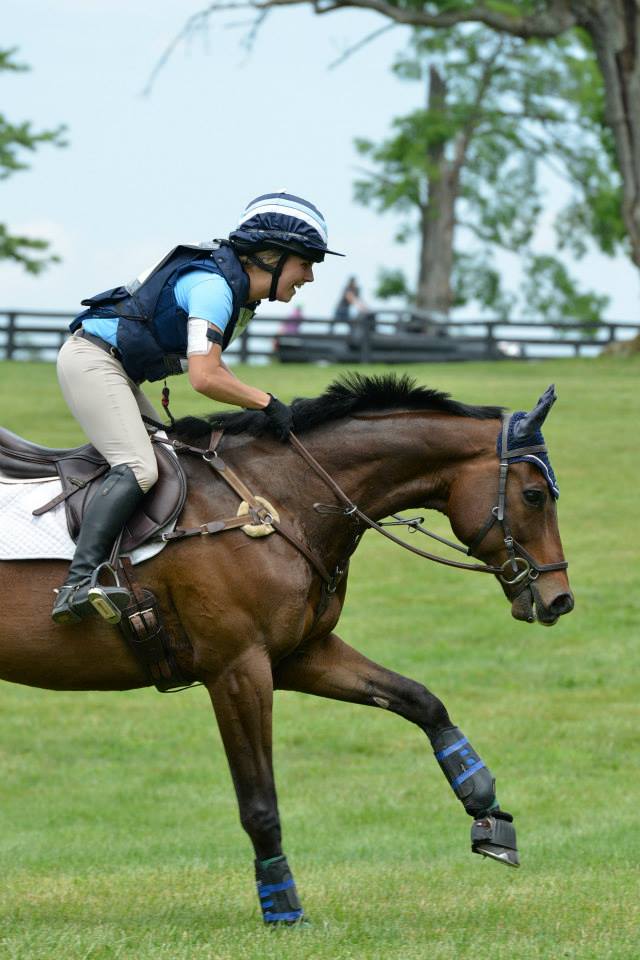I knew the news was bad about Philippa Humphreys hours before it was ever released. I was doing what I always do on the weekends of the “big ones.” Scrolling through Eventing Nation, constantly refreshing, trying to see the latest update or the most recent scores. My trainer Allie Knowles was four or five riders away in the 3*, and I just wanted to know if she had gone clean—if she was safe. But then I saw there was a fall and a hold. Philippa Humphreys had come off, which made my stomach sink.
I didn’t know Philippa well. My only knowledge of her was from sharing a warm up arena a few times at the Kentucky Horse Park. When the bigger riders come to compete against you at novice or training, you know. There is an aura around them; a certain confidence. And yet, as I passed her left to left, I didn’t see anything cocky. Instead we exchanged a smile and a head nod. She was laughing at her green horse and exchanging conversation with the other riders.
I remember thinking how nice of a rider she was—soft and efficient, with a strong seat and gorgeous equitation. And when she beat me, I chalked it up to the norm. I pencilled her name into my brain, acknowledging that I needed to follow her future endeavors. But then I read last night that she had passed, and alongside my sunken stomach, my heart broke.
I wasn’t there. I don’t know how the footing to the fence was. I don’t know if it was rider error, horse error, course design error or hell, just absolute bad luck.
But what I do know is that this was a prepared rider, a fit horse and a galloping fence. Not a technical question, nor a horse that couldn’t read the question. Not a rider who was just kicking and praying.
I am not making excuses. I truly believe eventing needs to change. I watched Rolex this year and was so thrilled to see how it had become a test of endurance instead of a test of confusion. As I watched the leader board get juggled around without any serious falls, I turned to my boyfriend and said, “This is how it should be.” Fitness. Strength. Letting not only XC, but the stamina for stadium play a role in the placings. Frangible pins broke and riders retired on tired horses, not a broken horses. At the end of the day, all of the competitors—equine and human—were tucked into their stalls and hotel rooms, ready to fight another day.
We all need to learn from this. Changes are coming. I think Rolex was a good example of that. And changes have already come. We are adding frangible pins, we are studying heart defects and disease, and we are inventing safety equipment, both for ourselves and our mounts, to protect us during a fall.
But even 50 years from now, even if we jump foam fences and wear hazmat suits, we will still be strapped to a 1200 lb. animal. A creature that has its own brain, own legs and own opinion. The risk will never be 100% removed from this sport. That needs to be acknowledged. If you are not ok with accepting at least a part of this risk, then riding horses is not for you. In fact, owning horses is probably not for you.
But it is for me.

I watched Rolex this year and was so thrilled to see how it had become a test of endurance instead of a test of confusion.
Four years ago I watched as my Uncle Bob neared the end. His battle with prostate cancer had turned into a battle with lung cancer, and the chemo was sucking the life, the soul, the heart and the brain out of a man that I loved dearly. It wasn’t my first time watching this grotesque end of life happen. I had seen the cancer, and the chemotherapy, do the same thing to my Uncle Doug, my grandfathers, and finally my father.
I called my friend Meghan in despair and angrily ranted about these mutant cells that were taking over my life again. I told her I truly believed that the cancer doesn’t kill the body, the chemo does. She agreed, and we began a long discussion about our plans. What would we do if we were diagnosed with terminal cancer? If you were told you only had a 30% chance of survival? Would I connect myself to that poison and fight? Or, would I spend as many good hours of my life doing what I loved? Which risk offered the most reward? Which route would leave my heart full and a smile on my face? Is it better to live half alive and scared, or with a full soul and galloping into the future?
I chose the latter. I told her that if I was diagnosed with cancer I would cash in all of my stocks, sell every article of anything that I owned and I would buy a 4* horse. If I had a year or two, I would go the legal route and try to qualify my way to Rolex. If I had a month, I would sign up as an outrider and then in a blind rage, I would suddenly kick my mount into a gallop and run screaming towards the Head of the Lake, passing Michael Jung with a pageant wave and an indian call.
That is how I want to go—happy, free, screaming, and smiling from ear to ear in joy. One stride, two strides, three strides and up. Soaring over a massive table, with one leg on either side of a creature I have always loved.
I don’t want to go out as just another victim of one of these horrible diseases that we walk 5K’s for. I want to go out with greatness. As one of the best. With the best. Or with a story. Something that will be told to every Rolex spectator for the next 50 years.

I will not make an excuse for the fence, I will not make an excuse for the fall. I will say a prayer for the family and friends that Philippa leaves behind, including a beautiful child. And I will give a strong nod to her from the warm up arena of life, acknowledging that we have lost a great woman, a great person, and a fabulous rider. One more warm up fence, and then off to the other side. She got there doing something she loved and while that is not enough to bring her back, it is enough to settle just a small amount of the heart break that so many are feeling.
Left to left, this world keeps shuffling us around. Left to left, we keep going. Keep galloping. Keep jumping. But left to left, we must keep loving. Keep thinking. Keep inventing. Keep changing. Because left to left, we must keep riding.
Read more from Carleigh at A Yankee in Paris: Stories of Horses in the Bluegrass





 May 16, 2016
May 16, 2016 






















